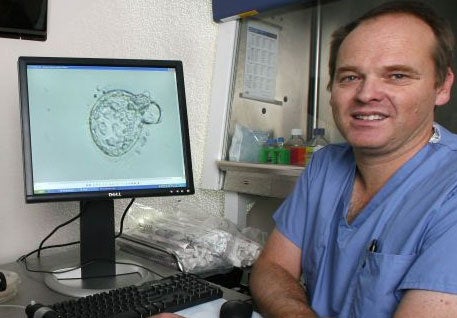First cloned embryo of adult human created

Cloned human embryos have been created from a male adult's skin cells for the first time using the same approach that led to the birth of Dolly the cloned sheep, a Californian company announced yesterday.
The five embryos did not develop beyond an early stage and the scientists were unable to extract embryonic stem cells from the clones, which would have been critical for research into many serious human diseases. It is not the first time that scientists have created cloned human embryos but it is the first time that it has been done by fusing a woman's unfertilised egg with the genetic material of an adult man's skin cells.
Earlier reports of this being done in South Korea had to be retracted after it emerged that the scientists involved had committed fraud. One other group at Newcastle University has successfully created cloned human embryos but this was done using embryonic cells rather than adult cells.
The company, Stemagen in La Jolla, said that the study published in the journal Stem Cells is the first step in developing the technology of deriving cloned embryonic stem cells from patients with serious disorders such as Parkinson's disease, multiple sclerosis or diabetes.
The same sort of process could also be used to create cloned human embryos that could in theory be implanted into a surrogate mother's womb to produce cloned babies. However, the company said this was not the intention of the research.
"We're the first in the world to take adult human cells and then document that we were able to clone embryos from them," said Samuel Woods, chief executive of Stemagen and co-author of the study.
The company sent out the cloned embryos to be DNA fingerprinted by external laboratories to validate the clones. This was done because this area of science has been tainted by the false South Korean claims. Other scientists said that although the study was important, it would have been more so had the team been able to extract stem cells from the cloned embryos and grow them in the laboratory for research purposes.
Stephen Minger, a stem cell biologist at King's College London, said that the researchers had used a disproportionately large number of human eggs to create the embryos.
"And disappointingly, the researchers did not go on to do the next step – to create embryonic stem-cell lines from cloned embryos. We are waiting with bated breath to see if anyone can do both steps together," said Dr Minger.
Robin Lovell-Badge, of the MRC National Institute for Medical Research, said the study was another step on the road to being able to generate stem cells from individual patients.
"This is the most successful description so far of the use of the cloning techniques with purely human material. However, it is still a long way from achieving the goal of obtaining embryonic stem cells," said Professor Lovell-Badge.
Stemagen scientists began with 23 human eggs derived from women attending a fertility clinic. Seven of the eggs died soon after their nuclear material was removed. Of the remainder, 14 responded correctly to the activation step, and 10 of these progressed over the next three days to form cleavage stage embryos with at least five cells, said Professor Lovell-Badge.
"Half of these then went on to make blastocysts [early embryos], the stage most commonly used to derive embryonic stem cells" he said.
* The fertility regulator gave the go-ahead for the creation of hybrid human-animal embryos yesterday. Applications from British scientists were approved by the Human Fertilisation and Embryology Authority in a move expected to attract protests. King's College London and Newcastle University can now use the embryos in the search for new medical treatments.
History of cloning
1996: Dolly the sheep is born. She is the first mammal cloned from an adult.
2001: American scientists announce first human cloned embryos but the research is not validated.
2004: South Korean researchers announce first cloned human embryos from cells of adult, published in peer-reviewed journal.
2005: South Koreans announce first embryonic stem cell lines from cloned human embryos but months later begin to admit that reports contain serious errors.
2006: Korean research shown to be fraudulent and studies are retracted.
2007: First cloned embryos of macque monkeys, followed by first report of embryonic stem cells derived from human skin cells by genetic engineering.
Subscribe to Independent Premium to bookmark this article
Want to bookmark your favourite articles and stories to read or reference later? Start your Independent Premium subscription today.

Join our commenting forum
Join thought-provoking conversations, follow other Independent readers and see their replies